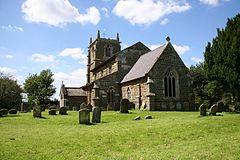Tetford
| Tetford | |
|---|---|
 St Mary's Church, Tetford |
|
| Tetford shown within Lincolnshire | |
| Population | 464 (including Salmonby, 2011) |
| OS grid reference | TF3374 |
| • London | 120 mi (190 km) S |
| Civil parish |
|
| District | |
| Shire county | |
| Region | |
| Country | England |
| Sovereign state | United Kingdom |
| Post town | HORNCASTLE |
| Postcode district | LN9 |
| Dialling code | 01507 |
| Police | Lincolnshire |
| Fire | Lincolnshire |
| Ambulance | East Midlands |
| EU Parliament | East Midlands |
| UK Parliament | |
Tetford is a village and civil parish in the East Lindsey district of Lincolnshire, England.
Tetford is listed as "Tesforde" in the Domesday Book, with a mill, probably on the site of the present 17th-century watermill near the centre of the village.
The parish contains traces of ancient encampments thought to be from Saxon times. It is reputed to be the site where Raengeires, a Briton, defeated the Saxon general Horsa in a great battle.
In 1841 the parish was noted for its fertiliser production made from burnt limestone.
The Edward Richardson Community Primary School was founded through a 1714 bequest from Edward Richardson of a cottage and about 7 acres (28,000 m2) of land towards teaching the poor children of Tetford and Salmonby. In 1821 a National School was built and enlarged in 1897 and 1899.
The White Hart Inn, parts of which date from the 16th century, was once the meeting place of the Tetford Club for local gentry, whose members included Tennyson from nearby Somersby.
During the 2007 United Kingdom floods the village was affected with East Road and West Road being flooded, causing the north of the village to be cut off from the south.
An electoral ward in the same name exists. This ward stretches south west to Mareham on the Hill with a total population at the 2011 Census of 2,196.
Tetford is situated in the Lincolnshire Wolds, a designated Area of Outstanding Natural Beauty, running from Louth in the north, to Horncastle in the south. The village is 6.5 miles (10.5 km) north-east from Horncastle, 10 miles (16 km) south from Louth and 8 miles (13 km) north-west from Spilsby. It is in a shallow valley, at the bottom of a 98 m (320 feet) high ridge on which runs the Bluestone Heath Road. The parish covers about 1,730 acres (7.0 km2).
...
Wikipedia

